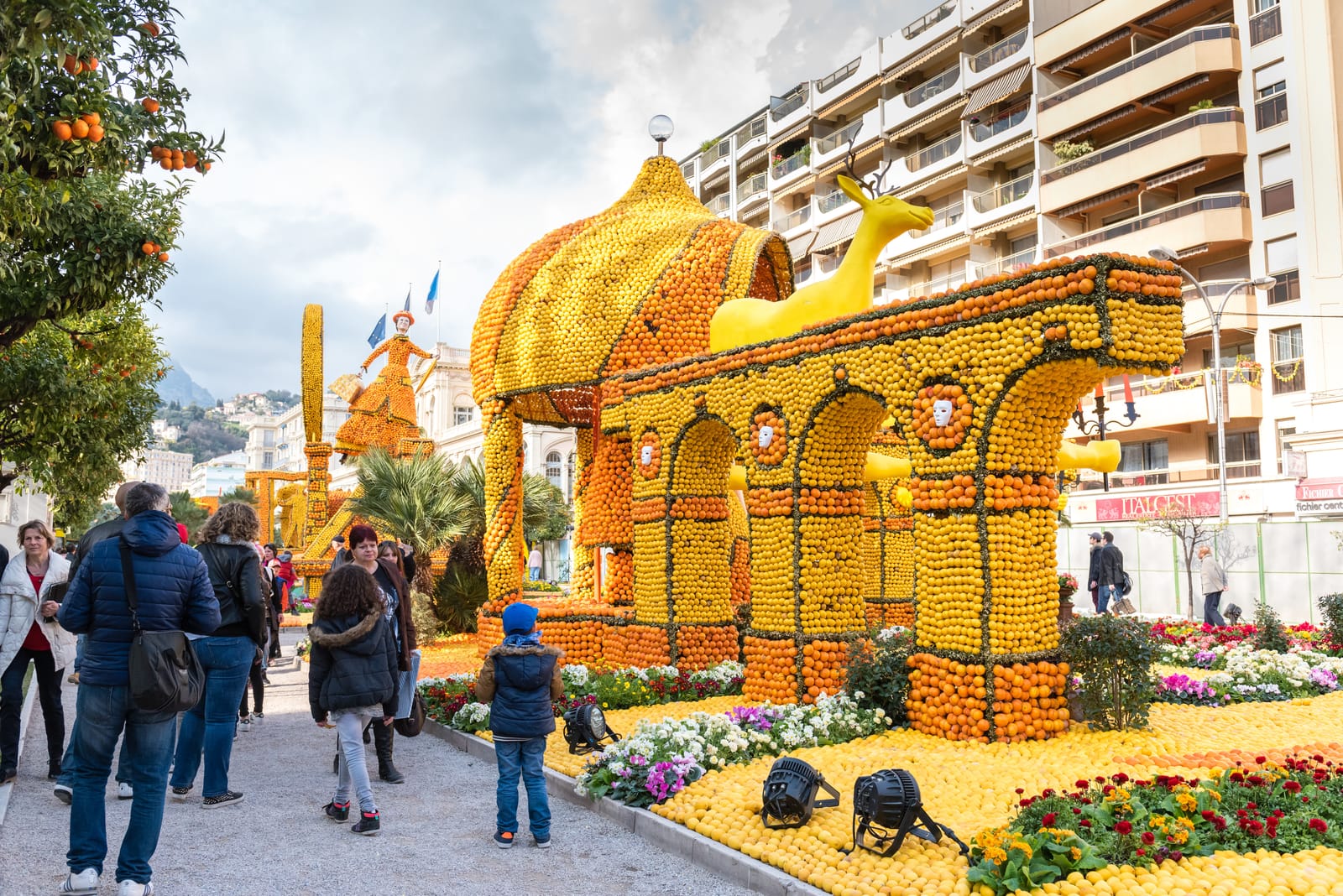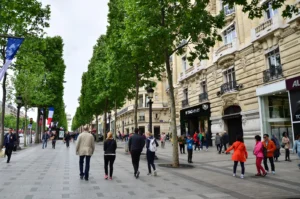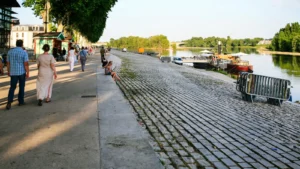You’ve spent hours scrolling through generic food festival lists, only to find yourself at overcrowded tourist traps serving mediocre food at inflated prices. The “authentic French culinary experience” you paid for turns out to be commercialized vendors hawking the same mass-produced items you could buy at any supermarket.
Meanwhile, locals whisper about incredible festivals happening in hidden villages—intimate celebrations where centuries-old recipes are shared, where you can taste ingredients that have never seen a grocery store shelf, and where genuine French food culture comes alive.
The frustration is real: France hosts over 400 food festivals annually, but finding the authentic ones requires insider knowledge that travel websites don’t provide.
You need to know when truffle hunters gather in Périgord forests, where Burgundy winemakers share their family reserves, and which village festivals offer hands-on experiences with techniques passed down through generations, not just expensive tastings designed for tourists with deep pockets.
Understanding French Food Festival Culture: Beyond Tourist Attractions
French food festivals are not typical food events—they are cultural celebrations rooted in regional identity, traditional methods, and seasonal ingredients. Unlike commercial fairs, these festivals honor specific foods as part of local heritage.
From Périgord’s truffles to Brittany’s oysters, each region showcases its pride through events tied to harvests, religious dates, or historical customs, offering authentic insight into everyday French life.
The Seasonal Rhythm of French Food Festivals
French food festivals follow the seasonal rhythms of agriculture and tradition. Spring celebrates fresh herbs and early vegetables. Summer features open-air markets and peak produce. Autumn marks harvest time for grapes, mushrooms, and nuts.
Winter honors preserved foods and festive specialties. Timing is key—truffle festivals happen only in winter, and wine events align with the autumn harvest. Visiting outside these windows means missing the heart of the celebration.
Regional Specialization and Terroir
Each region’s food festivals reflect its unique terroir—the soil, climate, and cultural heritage that shape local specialties. Provence celebrates herbs and Mediterranean flavors, Normandy highlights apples, calvados, and dairy, while Brittany focuses on seafood like oysters and mussels.
Understanding these regional distinctions helps travelers plan routes that align with authentic local experiences. Terroir also influences how food is prepared and shared. Festivals offer rare access to generational techniques and community traditions far beyond what restaurants or classes can provide.
Spring Food Festivals: Fresh Beginnings and Seasonal Celebrations
Spring in France brings renewal not just to the landscape, but to the culinary calendar. As winter preserves give way to fresh ingredients, French food festival celebrations honor the season’s first harvests and traditional preparations that welcome warmer weather.
Spring festivals offer unique advantages for travelers: smaller crowds than summer events, mild weather perfect for outdoor celebrations, and ingredients at their absolute freshest. The festivals during this season often feel more intimate and authentic, as they primarily serve local communities rather than tourist crowds.
La Fête du Citron (Lemon Festival), Menton
Photo from unlimphotos. Lemon Festival (Fete du Citron) in Menton town on the French Riviera
Held in the sun-soaked town of Menton, close to the Italian border, the Lemon Festival is a citrus-themed carnival. Over 145 tons of lemons and oranges create massive sculptures, floats, and garden displays.
But it’s not just about the visual appeal—local restaurants and stalls serve up lemon-infused delicacies, from tarts and liqueurs to savory sauces. The event includes nighttime parades, music, and fireworks, offering a full-blown sensory celebration of Menton’s most famous crop.
Festival des Herbes de Provence
Held annually in the picturesque village of Forcalquier in southeastern France, the Festival des Herbes de Provence is a vibrant tribute to the region’s aromatic heritage. This one-day event brings together local farmers, herbalists, chefs, and artisans to showcase the cultural and culinary value of Provençal herbs like thyme, rosemary, sage, and lavender.
Visitors can enjoy guided foraging walks, cooking demonstrations, herbal remedy workshops, and bustling markets filled with essential oils, teas, and handcrafted goods. It’s a unique opportunity to experience the traditions behind France’s most iconic herbs in the heart of Haute-Provence.
Fête de l’Asperge (Asparagus Festival) – Provence
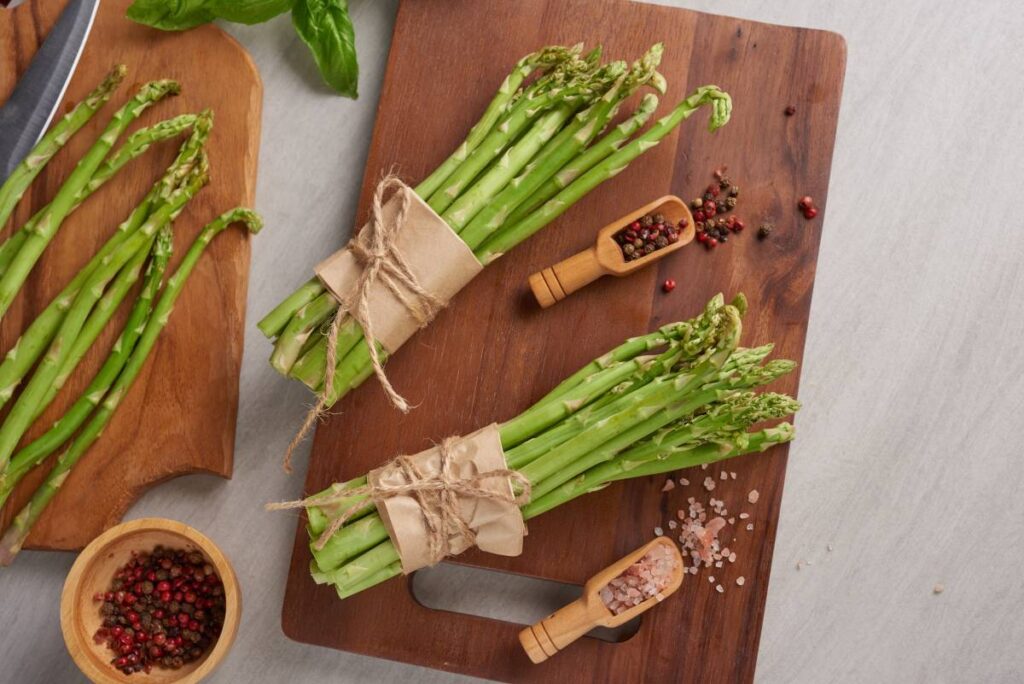
Photo from freepik. Branches of fresh green asparagus on a wooden surface
Held in late April, this festival honors Provence’s prized white asparagus, grown in sandy soils that yield exceptionally tender spears. Set in small Provençal villages, the event offers direct interaction with growers and showcases traditional cooking methods passed down through generations.
Local chefs demonstrate classic and modern preparations, such as asparagus with hollandaise and olive oil-grilled variations. Farm visits, tastings, and live demos offer a complete sensory introduction to one of spring’s most celebrated ingredients.
Summer Food Festivals: Peak Season Celebrations
Summer is the peak season for food festivals in France, blending ideal weather, fresh ingredients, and lively holiday schedules. These events highlight the full bounty of French agriculture—ripe fruits, summer vegetables, and traditions rooted in outdoor dining and community gathering.
While the variety is unmatched, travelers must navigate tourist-heavy events to find the most authentic local celebrations.
Festival de la Tomate (Tomato Festival) – Provence and Languedoc
Celebrated in various towns across Provence and Languedoc, the Festival de la Tomate honors tomatoes’ rich agricultural roots and culinary importance in southern French cuisine. Typically held in late summer, this vibrant festival features 100 varieties of heirloom and modern tomatoes, drawing gardeners, chefs, and food lovers alike.
The event includes tomato tastings, local produce markets, cooking contests, and seed exchanges. Workshops on organic gardening and sustainable farming add an educational touch, while live music and family activities make it a festive outing. It’s a flavorful celebration of regional pride and Mediterranean bounty.
Festival du Melon (Melon Festival) – Cavaillon
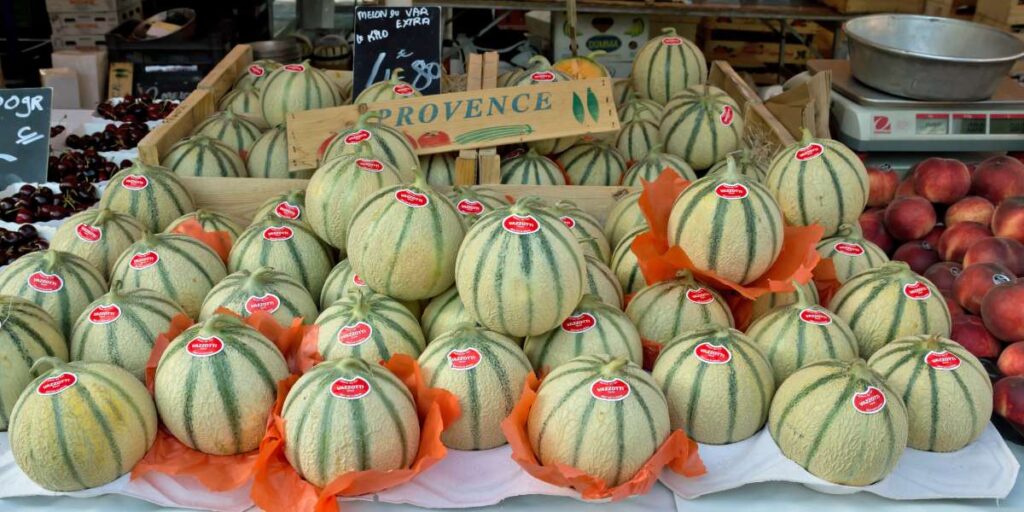
Photo from freepik. Stacked Cavaillon melons with labels at a Provence market during the Melon Festival
Held each July in the Provençal town of Cavaillon, the Festival du Melon—also called Féria du Melon—is a lively tribute to one of the region’s most iconic fruits: the Melon de Cavaillon. Timed just before Bastille Day, the festival fills the town with parades, open-air markets, and communal feasts centered around the juicy, fragrant Charentais melon.
Visitors can enjoy melon tastings, traditional Provençal music, Camargue horse demonstrations, and artisan stalls. Highlights include the colorful procession led by the Brotherhood of the Knights of the Melon and cooking contests featuring local chefs. In 2025, the celebration took on added significance, marking the melon’s new IGP (Protected Geographical Indication) status—a recognition of its regional heritage and exceptional quality.
With its rich blend of culinary pride, cultural tradition, and summer joy, the Melon Festival is a can’t-miss event in the heart of southern France.
Autumn Food Festivals: Harvest Celebrations and Culinary Traditions
Garden dining terrace for a French chateau wedding at Château de Lasfonds.
Autumn marks the peak of the French agricultural calendar, when harvest festivals celebrate the season’s abundance and prepare communities for winter. These events highlight preservation, fermentation, and transforming fresh ingredients into staples like wine, cheese, and cured foods.
Rooted in rural traditions, autumn festivals are directly linked to the techniques and cultural practices that continue to shape French cuisine today.
La Fête des Vendanges (Wine Harvest Festival) – Throughout France
La Fête des Vendanges is held in wine-producing regions across France each autumn, marking the end of the grape harvest. Rooted in centuries-old tradition, the festival blends agricultural heritage with community celebration. Visitors can witness grape stomping, enjoy wine tastings, and take vineyard tours.
Events often include local food markets, folk music, and parades featuring regional costumes. In places like Montmartre in Paris or Banyuls-sur-Mer in Languedoc, the festival draws thousands, offering a unique look into France’s winemaking culture at its most vibrant and authentic. Learn more about the Best Wine Regions in France to enhance your festival itinerary with nearby vineyard experiences.
Festival de la Truffe (Truffle Festival) – Périgord
Each January, Périgord honors its prized tuber melanosporum in festivals across towns like Sarlat-la-Canéda and Sorges. The highlight is the two-day Truffle Festival in Sarlat, typically mid‑January (January 18–19 in 2025). It features bustling markets, cooking workshops, live truffle-hunting (cavage) demos with dogs, and tasting stalls serving truffle “couscous” and foie gras.
Culinary students compete for the Jean Rougié trophy in a prestigious contest, while visitors can learn truffle identification, attend wine pairings, and sample local dishes under the medieval skyline.
Meanwhile, in Sorges on the last weekend of January, a companion festival includes a market, omelette contests, music, and even a competition for the biggest truffle. These celebrations offer an immersive taste and tradition of the Périgord “black diamond.”
Winter Food Festivals: Comfort Foods and Holiday Traditions
Winter food festivals in France highlight preserved foods, holiday specialities, and traditional comfort dishes that have sustained communities for generations. These events offer insight into family recipes, preservation methods, and winter dining customs.
With smaller crowds and a focus on seasonal techniques, they provide travelers with an authentic and intimate culinary experience.
Festival de la Choucroute (Sauerkraut Festival) – Alsace
Every autumn, villages in Alsace—most notably Krautergersheim and Meistratzheim—host vibrant Fête de la Choucroute events celebrating the region’s iconic sauerkraut. These festivals, held on the last weekend of September (with Krautergersheim extending into early October), kick off with dancing sauerkraut feasts under large tents and live folk music.
Days begin before dawn with flea markets and artisan stalls, followed by cabbage‑cutting demos, craft displays, and regional food offerings.
The highlight arrives early afternoon: a lively procession of floats, tractors laden with cabbage, horse‑drawn carriages, and performers in traditional dress, creating a festive, folkloric spectacle.
In Krautergersheim alone, around 10 000 visitors enjoy over 1 000 meals and several tons of sauerkraut, all showcasing the rich heritage of choucroute d’Alsace. These events combine regional pride, gastronomic tradition, and communal joy in the heart of Bas‑Rhin wine country.
Fête de l’Oie (Goose Festival) – Southwest France
Every September, villages in Alsace—especially Krautergersheim and Meistratzheim—come alive for the Fête de la Choucroute, a festive tribute to the region’s beloved sauerkraut. Held over the last weekend of the month, the celebration starts with hearty communal meals under large tents, accompanied by traditional folk music.
Visitors can browse flea markets and artisan stalls, learn about cabbage preparation through live demonstrations, and explore local crafts. A festival highlight is the vibrant procession—floats, tractors loaded with cabbage, horse‑drawn carts, and participants in traditional attire—parading through town mid‑afternoon.
In Krautergersheim alone, thousands gather to enjoy over a thousand sauerkraut meals, showcasing the region’s culinary heritage and communal spirit. This event is a flavorful celebration of Alsace’s gastronomic pride and cultural tradition.
Festival du Chocolat (Salon du Chocolat) – Various Locations
Photo from unlimphotos. salon du chocolat in Lyon, France.
Since its inception in Paris in 1994, the Salon du Chocolat has become the world’s foremost chocolate festival. Editions are held annually in cities like Paris and Lyon. Paris hosts its flagship event every late October to early November at the Porte de Versailles.
Over five days, the festival attracts around 100,000 visitors and features roughly 280–500 exhibitors, including master chocolatiers, pastry chefs, cocoa producers, and artisans from across the globe.
Attendees can explore chocolate stalls, sample exotic cocoa blends, watch live pastry and chocolate-making demos in the Pastry Show, and attend industry talks in the Chocosphère. A signature highlight is the spectacular chocolate fashion show, where models wear elaborate gowns crafted entirely from chocolate. The 2025 Paris edition marks the festival’s 30th anniversary, promising even more grand installations, masterclasses, and immersive experiences.
Alongside Paris, the festival has expanded internationally, with major editions held in Lyon every February. These editions offer interactive workshops, tastings, culinary displays, and a chocolate-themed runway show around Valentine’s Day.
Regional Specializations: Understanding Local Festival Traditions
Luxury Château de Lasfonds under blue sky
Each French region has developed distinctive festival traditions that reflect local ingredients, cultural influences, and historical developments. Understanding these regional specializations helps travelers choose festivals that align with their culinary interests and provides context for appreciating local traditions.
The diversity of regional festivals reflects France’s complex culinary geography, where different climates, soils, and cultural influences have created distinctive local cuisines. These regional differences make France unique among food destinations—you can travel short distances and encounter completely different culinary traditions.
Normandy: Apple and Dairy Celebrations
Normandy’s rich agricultural heritage is celebrated through seasonal festivals honoring its iconic apples and dairy products. In autumn, events like the Fête de la Pomme et du Cidre (Apple and Cider Festival) occur in villages such as Conches and Vimoutiers, featuring apple pressing, cider tastings, and traditional music.
Spring and summer festivals highlight local cheeses like Camembert, Livarot, and Pont-l’Évêque, with markets, farm tours, and artisanal tastings. These events offer a flavorful insight into Normandy’s rural traditions and culinary pride.
Provence: Mediterranean Influences and Herb Traditions
Provence’s cuisine and culture are profoundly shaped by its Mediterranean climate and terrain, where olive oil, garlic, and sun-drenched herbs form the foundation of daily life. Festivals like the Fête des Herbes de Provence celebrate thyme, rosemary, and lavender with markets, foraging walks, and herbal workshops.
These traditions reflect the region’s emphasis on seasonal, aromatic ingredients and natural wellness, blending ancient agricultural practices with a modern appreciation for flavor, health, and biodiversity.
Château de Lasfonds: Your Culinary Gateway to French Food Festivals
Château de Lasfonds entrance
After immersing yourself in France’s incredible food festivals, you’ll want a luxurious retreat to reflect on your culinary discoveries and perhaps recreate some of the techniques you’ve learned. Château de Lasfonds provides the perfect base for exploring the renowned food festivals in France, particularly those of the Périgord and Bordeaux regions.
This historic château, built between 1849 and 1893 by a prominent Bordeaux merchant family, sits majestically atop a hill surrounded by 6.5 hectares of pristine parkland. The location places you at the heart of one of France’s most celebrated culinary regions, where black truffles, exceptional wines, and traditional French cuisine converge to create unforgettable gastronomic experiences.
Culinary Heritage at Your Doorstep
The château’s location in the border region of Charente and Périgord Vert perfectly positions you to experience authentic French food festival celebrations. It’s also a great base if you want to explore beyond gastronomy—see our curated list of the Best Places to Visit in France to plan a complete cultural and culinary journey.
This area hosts some of France’s most prestigious truffle festivals during the winter months, harvest celebrations in autumn, and seasonal markets throughout the year that showcase the exceptional produce that makes French cuisine legendary.
Modern Comfort Meets Culinary Tradition
The château seamlessly blends historical elegance with contemporary amenities essential for food enthusiasts. The state-of-the-art kitchen features professional-grade equipment perfect for recreating festival techniques you’ve learned, from truffle preparation to traditional preservation methods.
High-speed Wi-Fi allows you to research festival schedules and local producers, while climate control ensures optimal food storage and preparation conditions.
The property accommodates up to 18 guests across beautifully appointed rooms, making it ideal for culinary groups, family gatherings, or friends who share a passion for authentic French cuisine—and it’s also a breathtaking venue for a French Chateau Wedding.
Spacious common areas provide perfect settings for sharing meals prepared with fresh discoveries. At the same time, the extensive grounds offer space for outdoor dining that showcases the peaceful beauty of the French countryside.
Your Festival Planning Headquarters
Château de Lasfonds exterior view
Château de Lasfonds is an ideal base for planning and experiencing multiple regional food festivals. The château’s location provides easy access to major transportation hubs—just 2.5 hours from Paris by TGV and convenient to regional airports—while maintaining the peaceful seclusion that allows you to disconnect and focus on culinary experiences.
The property’s professional kitchen and dining spaces allow you to host intimate food festivals, perhaps featuring ingredients and techniques discovered during your festival journeys. Imagine preparing a traditional truffle dinner using techniques learned at Périgord’s famous truffle festivals, or hosting a wine tasting featuring discoveries from local harvest celebrations.
Creating Your Culinary Legacy
Whether you’re planning to experience the region’s famous festivals in France or create your culinary celebration, Château de Lasfonds provides the perfect setting for honoring French food traditions while enjoying modern luxury. The château’s blend of historical significance and contemporary comfort creates an atmosphere where culinary discoveries become lasting memories. Your journey into authentic French culinary culture begins with choosing accommodation that honors tradition and luxury—explore more Reasons to Stay in a Château in France.
Reserve your stay at Château de Lasfonds and discover why this exceptional estate complements France’s incredible food festival experiences. Your journey into authentic French culinary culture begins with Renting a castle in France that honors tradition and luxury.
FAQs about French Food Festivals
When do the best French food festivals occur throughout the year?
Food festivals in France follow seasonal patterns: spring features asparagus and herb festivals (April-May), summer showcases tomato and lavender celebrations (June-August), autumn brings wine harvest and mushroom festivals (September-November), while winter focuses on truffle and preserved food festivals (December-February). Planning around these seasons ensures optimal experiences.
How do I find authentic French food festivals rather than tourist events?
Authentic French food festival experiences occur in smaller villages during actual harvest seasons. They feature local producers rather than commercial vendors and focus on traditional techniques rather than entertainment. Research festivals through regional tourism offices, seek events where locals participate actively, and avoid those heavily advertised to international tourists.
What should I expect at a traditional Cajun food festival in France?
While Cajun food festival celebrations are primarily American traditions, some French regions host Acadian cultural festivals that honor the historical connections between French Acadians and Louisiana Cajun culture. These events typically feature traditional French-Canadian cuisine, folk music, and cultural demonstrations celebrating shared heritage.
Are French food festivals suitable for families with children?
French festivals welcome families and provide educational opportunities for children to learn about traditional food production, regional agriculture, and cultural heritage. Many festivals include hands-on activities, farm visits, and demonstrations that engage younger visitors while teaching valuable lessons about food traditions.
How much should I budget to attend multiple French food festivals?
Budget €50-150 per person per festival for entrance fees, tastings, and workshops at food festivals in France. Add accommodation costs, transportation between festivals, and meals not included in festival activities. Premium festivals and private experiences command higher prices but offer more exclusive access.
Do I need to speak French to enjoy food festivals in France?
Many famous French festivals accommodate international visitors with some English-speaking staff or volunteers. Learning food-related vocabulary enhances experiences significantly. Food festival organizers often appreciate visitors’ efforts to engage in French, regardless of proficiency level.
What’s the difference between commercial and traditional French food festivals?
Traditional French festivals focus on cultural heritage, seasonal celebrations, and community participation, while commercial events prioritize entertainment and tourism revenue. Authentic festivals feature local producers, traditional techniques, and educational components. Whereas tourist-oriented events may emphasize convenience and entertainment over cultural authenticity.
Can I participate in food production activities at French food festivals?
Many authentic French food festival celebrations encourage hands-on participation through grape harvesting, truffle hunting, cheese-making demonstrations, and traditional cooking workshops. These participatory experiences provide a deeper understanding of French food traditions and represent the memorable aspects of festival attendance.
How do I efficiently plan a route to experience multiple famous French food festivals?
Plan routes around seasonal patterns and the geographic proximity of French festivals. Combine spring Provence festivals with summer Loire Valley celebrations, or follow autumn harvest festivals from Burgundy through Bordeaux. Use high-speed rail for longer distances and rental cars to access smaller festival locations efficiently.
